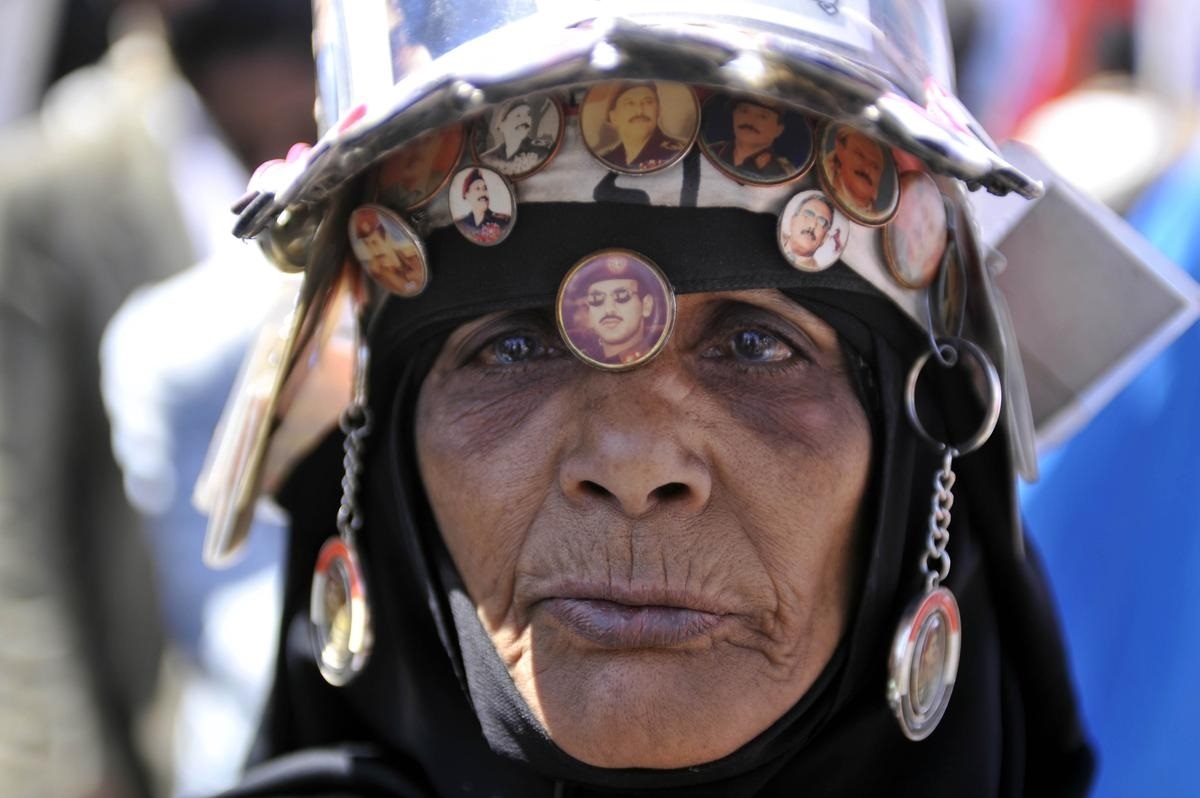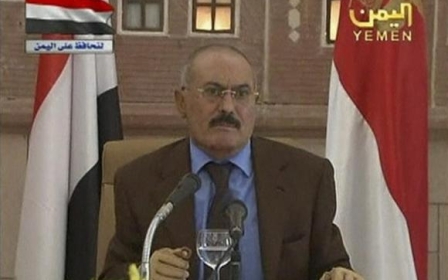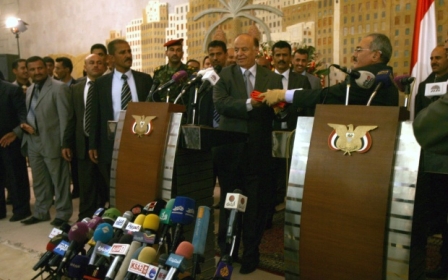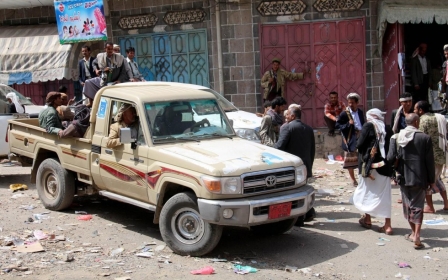Yemen’s Saleh hits back at UN sanctions

AL MUKALLA, Yemen: Former Yemeni president Ali Abdullah Saleh continues to make his mark on national politics, three years after he was forced in November 2011 to agree to a political transition in the country and formally ceded power in January 2012.
On Friday, Saleh addressed thousands of his followers in the Yemeni capital, telling them that while he had agreed to relinquish power, he will not leave the country
“I was born and raised in this country and will die in this country. We accepted leaving power, but will not accept leaving the country,” he told the droves of supporters who had gathered outside his home.
The United Nations last week said it was imposing sanctions against Saleh and two prominent figures loyal to the Houthi rebel movement that seized the capital more than a month ago.
Saleh ruled poverty-stricken Yemen from 1987 until being forced to step down after months of nationwide protests inspired by the Arab Spring in 2011.
Although he has long left the presidential palace and handed over command of the army, Saleh’s critics have repeatedly stressed that the former president continues to pull the strings from behind the scenes and has stoked violence in order to undermine the transitional government.
Saleh, to be sure, continues to command some popular support. On Wednesday, he roused the faithful by claiming that the US ambassador to Yemen, Matthew H Tueller, had sent him a message through an envoy of “a big country” asking Saleh to leave the country before Friday or face UN sanctions.
Saleh’s party, the General People’s Congress (GPC), issued a statement saying that the ambassador’s remark was a “flagrant interference” in Yemen affairs. The US denies the allegations.
Media campaign
The news about the alleged conversation was broken by Sultan al-Barakani, a senior GPC member, who told affiliated media that an ambassador of a great country had asked the 72-year-old Saleh to leave Yemen.
Immediately, Saleh drummed up support by calling on the US ambassador to apologize. Whatever the merit of the claims, thousands of people flocked to Saleh’s home to pay homage and hear him stand firm against the alleged international bullying.
On Friday, the UN issued a statement imposing the long-expected sanctions on Saleh and two Houthi figures for obstructing the political process and undermining peace and stability in the country.
The sanctions are under Security Council Resolution 2140, which was issued in February this year and threatened to impose asset freezes and travel bans on individuals who tried to derail the political transition.
Saleh’s camp was quick to brush off the move.
“Saleh is not a globe-trotter. The sanctions will only have [a] moral impact on the man who is behind important changes in the country,” Barakani told Azzal TV on Wednesday. “He should not be honored in that way. Saleh has lived in the hearts of the Yemenis for ages. The sanctions will add insult to injuries and cause rift and repercussions.”
Sacking
When the GPC convened on Saturday morning to discuss the sanctions, its response was swift and bold. President Hadi was sacked as secretary general of the party, and the UN was rebuked in the strongest possible terms.
For nearly two decades before succeeding Saleh as president, Hadi had served as his deputy in both the party and the state, but now his own party is accusing him of fraternising with the enemy, claiming that he and the UN Special Envoy to Yemen, Jamal Binomer, pressed the UN to impose the sanctions on Saleh.
The party also approved resumed broadcasting by Yemen Today, the party’s mouthpiece, after months of suspension. The TV station has been off air since June, when the presidential guard stormed the station’s headquarters in the capital over its role in inciting people to protest against Hadi’s government.
A foreign diplomat told Middle East Eye that the sanctions mainly target the former president because he is believed to have helped the Houthis to gain control of the capital.
“Houthi sanctions are largely symbolic - we know that, they know that; but the international community can’t let taking a capital city by force go unpunished. The Houthis could not have taken Sana’a as quickly as they did without Saleh’s assistance,” said the diplomat, who could not give his name because he is not authorized to speak to the media.
“GPC is splitting between the hardliners, who will go down fighting with Saleh, and the moderates, who want to save their party, their country and, of course, their own skins. But they are afraid of Saleh.”
Late punishment
Just days after they were announced, the sanctions already appear to be backfiring, with the country’s political transition process more at risk than ever.
Abdubari Taher, a veteran political analyst, told MEE that the sanctions have accompanied the transitional period since day one, and that they would have defanged Saleh if they were initiated a few years ago, soon after he was forced to step down.
“Unfortunately, the sanctions have come too late. They would have stopped Saleh from continuing to destroy the country in the last three years,” Taher said.
According to Taher, Saleh’s greatest strength is his continued hold over some army units that were once under the command of Saleh’s son, Ahmed, and continue to swear allegiance to the Salehs, despite Ahmed’s dismissal during a major military reshuffle in 2012.
He is also a shrewd political tactician and understands that amassing supporters in the capital sends a firm message to the international community that he is still a force to be reckoned with.
Saleh “wants to blackmail” the regional and international community “by saying that he is still the strongest figure in the country”, Taher said.
Boycott
The sanctions-related wrangling is happening in the midst of a power vacuum within Yemen, which for months has seen Hadi struggle to form a new cabinet. One was announced at long last on Friday after he missed a late-October deadline that had been agreed as part of a peace deal with the Houthis in September.
The president appointed a new defence minister and interior minister and gave women 15 percent of the cabinet for the first time since 1990. The GPC was given just one seat in the cabinet.
Before the new lineup was announced, Hussien Hazeb, a prominent GPC member, told MEE that his party would walk away if rival parties were given more seats, and walk they did, saying on Saturday that it was boycotting the new cabinet and pulling their only minister.
Welcome
A long-time opponent of the former president, 2011 Nobel Peace Laureate Tawakkol Karaman, has praised the UN sanctions against Saleh and the Houthi figures, urging the Yemen government to prosecute him for alleged crimes during his 33-year old rule.
She described the sanction that drops the immunity that Saleh obtained at the beginning of the transitional process.as a “move in the right direction”.
To convince Saleh to leave office, the Yemeni parliament in January 2012 unanimously approved a law giving him and his aides immunity from prosecution under the transition deal brokered by the Gulf Co-operation Council.
“The Yemeni government must start bringing him to justice for crimes that he committed that prompted the UN sanction him and all crimes against the people,” she said.
Karaman, a leading figure in the 2011 protests that eventually led to Saleh’s removal from power, claimed that the former president has stolen billions of dollars during his days in office.
Before Yemen can move on, it needs to address these past grievances, she explained in a posting on her Facebook page.
New MEE newsletter: Jerusalem Dispatch
Sign up to get the latest insights and analysis on Israel-Palestine, alongside Turkey Unpacked and other MEE newsletters
Middle East Eye delivers independent and unrivalled coverage and analysis of the Middle East, North Africa and beyond. To learn more about republishing this content and the associated fees, please fill out this form. More about MEE can be found here.




